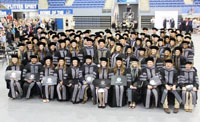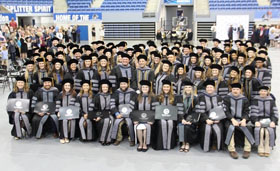Midwestern earns U.S. accreditation while Lincoln Memorial waits
!This story has an important update

LMU graduates

Facebook photo
Lincoln Memorial University in Harrogate, Tennessee, graduated its first class of veterinary students on May 19. The four-year program is working toward earning U.S. accreditation.
The nation's sole evaluator of U.S. veterinary education voted to fully accredit just one of two new American veterinary colleges that, until now, appeared to be on identical tracks in the accreditation process.
Midwestern University College of Veterinary Medicine earned the approval of the American Veterinary Medical Association Council on Education, a body authorized by the U.S. Department of Education to serve as a programmatic accreditor of domestic veterinary education. The COE also evaluates some foreign programs.
The COE voted on Midwestern's evaluation in late September, making it the 29th fully accredited veterinary program in the country, according to a recently published notice.
Noticeably absent among a slew of COE actions was a decision to accredit Lincoln Memorial University College of Veterinary Medicine. The program, based in Harrogate, Tennessee, remains classified as provisionally accredited, a temporary status that can be granted for no more than five years, according to COE policies and procedures.
Both Midwestern and LMU opened their doors to students in 2014, each having received letters of reasonable assurance, a status issued by the COE when evaluators believe a program has a feasible plan for achieving full accreditation. The designation provides students with access to federal education loans.
When Midwestern and LMU graduated their inaugural classes in spring 2018, they became eligible for full accreditation. The decision to keep LMU on provisional accreditation was based on a COE site visit conducted in late March, said Sharon Granskog, associate director of AVMA media relations. Asked why LMU was not fully accredited alongside Midwestern, Granskog declined to explain.
She said only: "LMU is working toward accreditation. They will maintain their provisional accreditation status until fall 2019. LMU may be able to give you more information regarding their plans."
If LMU fails to receive full accreditation by the time its provisional status expires, it can be placed on terminal status, which indicates that the program's deficiencies are severe and cannot be corrected before the next first-year class is admitted. While the COE may revoke the accreditation of any program placed on terminal status, due process is allowed before that happens. A program seeking to shed its terminal status must first stop enrolling new students and commit adequate resources to meeting the COE's conditions for improvement.
Dean Dr. Jason Johnson did not respond to repeated requests to explain why the school is not yet accredited. Neither did his colleagues. Of the half-dozen LMU administrators contacted by VIN News, some did not reply. Others said they couldn't.
"I'm sorry I can't help you," said Dr. John Dascanio, a theriogenology professor and associate dean of academic affairs. "Anything that I might say would have to go through the dean. You'd need to talk to him."
More than 400 students have enrolled in the LMU veterinary college during the last four years, according to the university. Eighty-seven graduated in May, the program's first class of graduates.
It's unclear how those graduates performed on the North American Veterinary Licensing Examination, a requirement for licensure to practice veterinary medicine in the U.S. and Canada. COE standards require that at least 80 percent of students pass the test. The COE also requires that schools report their pass rate, but LMU has not posted the examination results on its website.
The International Council for Veterinary Assessment, which administers the NAVLE, does not publicize the results from individual colleges.
Most U.S.-accredited veterinary programs make their class NAVLE scores public, as mandated by COE policies and procedures.
Ross on probation
Ross University School of Veterinary Medicine in the Caribbean posted an 82 percent pass rate for its class of 2018, according to the program's website. Although Ross met the accreditation requirement on the exam pass rate, the COE elected during its September meeting to put the program on probation.
Ross reports that the COE found a "major deficiency" with its outcomes assessment standard. It did not identify the deficiency.
"The DVM program remains accredited by the AVMA COE while on probationary accreditation and therefore it will not impact current students with regard to licensure, clinical training or employment opportunities," a statement on the Ross website reads. The program has two years to correct any problems. Colleges on probation must submit progress reports to the COE every six months.
According to the COE's 11 standards, the outcomes of an accredited veterinary medical degree program — including student achievement — must be measured and analyzed for needed improvements. "New graduates must have the basic scientific knowledge, skills, and values to provide entry-level health care, independently, at the time of graduation. ...Processes must be in place to remediate students who do not demonstrate competence in one or more of the nine competencies," the standards say.
To meet the COE's standard for outcomes assessment, colleges must have a way to observe and evaluate students while tracking whether the assessments accurately reflect their command of nine competencies:
- comprehensive patient diagnosis (problem-solving skills), appropriate use of diagnostic testing, and record management
- comprehensive treatment planning, including patient referral when indicated
- anesthesia and pain management, patient welfare
- basic surgery skills and case management
- basic medicine skills and case management
- emergency and intensive care case management
- understanding of health promotion, and biosecurity, prevention and control of disease including zoonoses and principles of food safety
- ethical and professional conduct; communication skills including those that demonstrate an understanding and sensitivity to how clients’ diversity and individual circumstance can impact health care
- critical analysis of new information and research findings relevant to veterinary medicine.
The COE's next comprehensive evaluation of Ross is scheduled for 2025.
Other accreditation actions
In addition to Ross, the COE continued probation for several other programs, including Oklahoma State University Center for Veterinary Health Sciences. The program has been on probation since September 2017, after a COE site visit revealed deficiencies involving its standards for financing, faculty, physical facilities, equipment, curriculum and outcomes assessment.
Officials with the program have blamed its shortcomings on a lack of funding from the state, which has cut appropriations 26 percent since 2015. The Oklahoma State Regents for Higher Education responded by permitting the program to enlarge its class size and enroll double its number of out-of-state students, who pay more for tuition than Oklahoma residents. The entering class in 2017 was the program's largest at 106 seats, reflecting an enrollee increase of more than 20 percent.
Additionally, the university agreed to grant the college $600,000 in new revenue each year to support hiring new faculty. "We're rebuilding," Dr. Chris Ross, then-interim dean of the program, said in a 2017 interview with VIN News.
Reached by email, current Dean Dr. Carlos Risco declined to address the COE's findings from its September meeting until the accrediting body considers the program's progress report, due Dec. 15.
The University of Pennsylvania School of Veterinary Medicine is on probation with a minor deficiency for failing to meet the COE's standard for physical facilities and equipment. The program's status is reflected on its website with no explanation for it. The same goes for the Universidad Nacional Autonoma de Mexico Facultad de Medicina Veterinaria y Zootecnia, or UNAM, in Mexico City, which was put on probationary accreditation due to a major deficiency in the program's physical facilities and equipment.
The COE re-accredited veterinary programs at Kansas State University, as well as the University of Melbourne and Murdoch University, both in Australia.
Programs at Washington State University, the University of Saskatchewan in Canada and St. George's University in the Caribbean were permitted to remain fully accredited with minor deficiencies. The programs have a year to correct the deficiencies or risk being placed on probation.
Update: LMU has posted the NAVLE results of its first class of graduates: 76 of 87 students passed, for a pass rate of 87.4 percent.